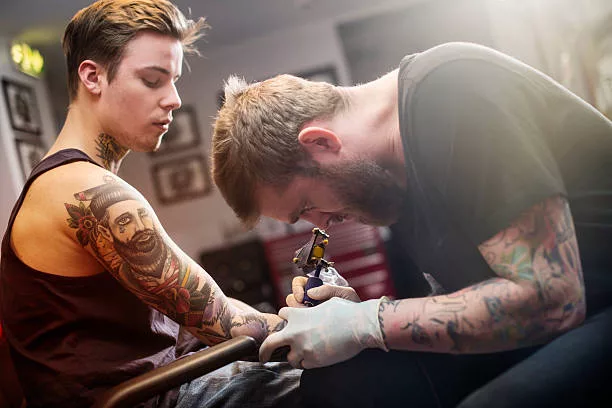Tattoos go beyond being mere body art. Certain groups attribute special meanings to tattoos, shaping perceptions of the wearer. If a tattoo doesn’t align with someone’s personality or social standing, it could be viewed as offensive.
While tattoos are often seen as personal expressions of art, some designs carry meanings that may not be widely known.
Here are 10+ tattoos with potentially dangerous or hidden meanings that many people might not be aware of:
Tear:

A tear under the right eye is commonly associated with having committed murder or attempted to do so. However, it’s important to note that many individuals get this tattoo as a tribute to a loved one serving time in prison or who has experienced a tragic death. In the criminal subculture, there’s a belief that every tattoo should be “earned.” Trouble may arise only when someone gets this tattoo casually, as it contradicts the notion of earning one’s ink in the eyes of those familiar with criminal traditions.
Buddha:

Wearing a tattoo of any god on the body is considered blasphemy, leading tourists with such tattoos to often find themselves at police departments when visiting Buddhist countries.
Having a Buddha tattoo on the body is a personal choice, but it’s essential to be aware of cultural sensitivities, especially when visiting Buddhist countries.
In some places, displaying religious figures, including Buddha, through tattoos may be considered disrespectful or offensive. It’s advisable to research and respect local customs and beliefs to ensure that your choice of body art is culturally appropriate and doesn’t inadvertently cause any misunderstandings or discomfort.
Yakuza:

In Japan, only people who are part of the Yakuza have the right to have such tattoos. This is the most powerful and bloodthirsty criminal gang in the country.
So anyone else who has this type of tattoo and is not Yakuza will most likely encounter trouble.
The Yakuza tattoo, also known as Irezumi, is a distinctive form of body art associated with the Japanese organized crime syndicate, the Yakuza. These tattoos are often intricate, covering large parts of the body, and feature traditional Japanese motifs such as dragons, koi fish, and flowers.
Yakuza tattoos are not just decorative; they hold significant meaning within the criminal organization. They symbolize the wearer’s commitment, loyalty, and status within the Yakuza hierarchy. The process of getting these tattoos is traditionally seen as a rite of passage and requires considerable dedication due to the extensive and painful tattooing sessions.
Shamrock:

While many people get shamrock tattoos as a symbol of luck, it’s crucial to note that a potential mix-up in the number of leaves could have unintended consequences. Specifically, if someone accidentally gets a shamrock tattoo with three leaves instead of four, it might be misinterpreted as a sign of affiliation with an Irish criminal gang. In such a scenario, if a gang member identifies an individual with this tattoo and realizes they are not part of the gang, it could lead to significant trouble for the person with the mistaken ink.
A shamrock tattoo typically features a three-leaf clover, and it’s a popular symbol associated with Irish culture and heritage. The shamrock is widely recognized as a symbol of good luck and is often linked to Saint Patrick, the patron saint of Ireland. People may choose to get a shamrock tattoo to express their Irish identity, celebrate their heritage, or simply embrace the positive connotations of luck and good fortune.
Barbed wire:

In the realm of organized crime, a barbed wire tattoo typically signifies a person’s conviction, with each knot on the wire representing a year spent in prison. Therefore, when a law-abiding citizen adopts this tattoo, ex-convicts may perceive it as offensive or even as a joke. This situation could significantly complicate the tattoo owner’s life by unintentionally conveying a message contrary to their actual background and experiences.
Snarling predators:

In mainstream perception, a snarling predator symbolizes bravery, courage, and strength. However, in criminal circles, individuals sporting this image on their body are often conveying an inclination toward violence and a readiness to commit aggressive acts without remorse. Consequently, having such a tattoo might lead to serious trouble, as criminals believe that one should earn the right to bear this symbol, associating it with a willingness to engage in violent activities.
Rings on fingers:

Finger rings serve as a quick and straightforward indicator of an individual’s criminal background and status within the prison hierarchy. Each ring represents the authority and experience gained during incarceration, signifying a respected person in prison. Consequently, if a former convict encounters these tattoos created casually for amusement, they are likely to disapprove, considering it an affront to their principles and undermining the significance these symbols hold in the context of their experiences.
Cross on the chest:

In Russia, having a large cross tattoo is considered highly perilous, as it is a mark associated with the most dangerous criminals. Getting this tattoo for amusement carries significant risks, as encountering an experienced criminal who recognizes it may lead to accusations of dishonesty or deception on the part of the tattoo owner.
In certain cultural or religious contexts, a cross on the chest may carry specific significance. It’s always advisable to be mindful of the potential cultural and social interpretations of religious symbols when getting tattoos, especially if they hold deep meaning for specific communities.
Spiderweb:

A spiderweb tattoo serves as a kind of personal history narrative among those with a criminal background. It signifies a lengthy period of incarceration and a battle with drug addiction, with each ring in the web representing a challenging year of the individual’s life. This symbol is how individuals with similar experiences recognize each other, and they typically have a strongly adverse reaction when someone gets these tattoos merely for aesthetic reasons, viewing it as a misappropriation of their shared struggles.
A spiderweb tattoo serves as a kind of personal history narrative among those with a criminal background. It signifies a lengthy period of incarceration and a battle with drug addiction, with each ring in the web representing a challenging year of the individual’s life. This symbol is how individuals with similar experiences recognize each other, and they typically have a strongly adverse reaction when someone gets these tattoos merely for aesthetic reasons, viewing it as a misappropriation of their shared struggles.
The 5-point crown:

In the United States, the five points of the crown symbolize the Latin Kings gang, one of the largest Hispanic gangs with a significant presence both inside and outside prison walls. Getting this tattoo casually is highly risky, given the notorious reputation of the gang and the potential consequences associated with misrepresenting affiliation with such a criminal organization.
It’s crucial to recognize the potential dangers and consequences associated with getting this tattoo, as it may be interpreted as falsely claiming affiliation with a criminal organization known for its illicit activities.
3 dots:

This small tattoo carries a universal message worldwide – “Mi vida loca” or “My crazy life.” While it doesn’t reveal specific details about the owner, it generally implies a connection to the criminal world or a history of breaking the law. If you haven’t experienced legal troubles, it’s advisable to avoid getting this tattoo unless intentionally seeking potential complications or misunderstandings.
However, it’s important to note that the meaning of the three dots can vary, and not everyone with this tattoo necessarily has a criminal background. In some cases, people may get the three dots tattoo for personal or aesthetic reasons without any connection to criminal activities.
Stars:

A star tattoo is a common choice among individuals with a history of incarceration, and its significance can vary based on its placement. For instance, stars inked on the knees may symbolize an unwavering refusal to submit to anyone’s authority, while stars on the shoulders could represent power and respect. It’s crucial to recognize that people from the criminal world often react negatively when they perceive others getting these tattoos casually for fun, as it may be seen as a misappropriation of symbols that carry deep meaning within their cultural context.
For example, stars on the knees might symbolize a steadfast refusal to submit to authority, while stars on the shoulders could signify power and respect.
Playing cards:

In organized crime circles, each playing card carries distinct meanings, collectively revealing details about a criminal’s background, the prisons they’ve been in, and their hierarchical status. If the significance of the cards doesn’t align with the owner’s life experiences, some individuals may perceive it as deceit or falsehood.
However, it’s crucial to note that playing card tattoos are not exclusive to criminal symbolism. Many people choose these tattoos for personal reasons, such as luck, risk-taking, or simply as a form of self-expression.
Rose, pierced with a dagger

This seemingly romantic tattoo is typically acquired in prison, specifically if a person enters prison before reaching adulthood. A rose without a dagger signifies that the individual became an adult (turned 18) while already incarcerated. Those with this tattoo are often regarded as experienced prisoners. If someone without a criminal record has this tattoo, it can potentially lead to conflicts or misunderstandings due to the misalignment between the symbol’s meaning and the individual’s background.
Clown

In Brazil, having this particular tattoo could pose a serious threat to your life as it is considered a highly disrespectful offense towards law enforcement. This is because, in the Brazilian context, these tattoos are typically associated with individuals who have committed the act of killing a policeman.
A clown tattoo is a multifaceted symbol that resonates differently for each individual. It might embody playfulness and humor, reflecting a whimsical approach to life. In a darker context, it could carry gothic undertones, hinting at the mysterious or macabre. Representing the circus or performance art, the clown may symbolize an affinity for entertainment or theatricality. Alternatively, it could serve as a symbol of mischief or rebellion, challenging societal norms.
Understanding the potential meanings behind these tattoos is crucial, as wearing them unknowingly could lead to misunderstandings or even put individuals at risk in certain social contexts. It’s essential to be aware of the cultural and historical significance of tattoo symbols to make informed choices about body art.










